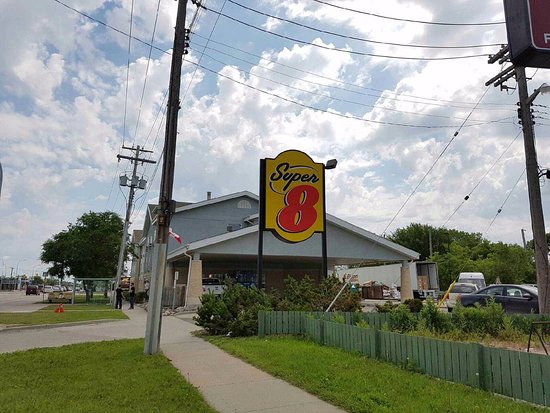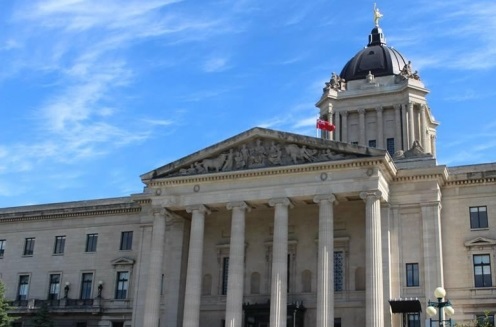 NewsNow
NewsNow
You may have seen it, a group of rail workers are on strike at the corner of Buchanon Ave. and Keays St in Dauphin.
Riley Helgeson is the strike leader and says they’re on strike in support of getting a new contract because the old one expired in July.
Helgeson says they’re looking for one thing in particular.
“Better rest rules. We want to be able to have a say in our rest and be fit and ready to go to work and alert and that kind of stuff.”
A couple of other unions from the Parkland such as CUPE have joined them.
Helgeson appreciates all the support they’ve received from the community, adding people have been dropping off coffee and doughnuts in support.
Riley anticipates the group being out there until they have a contract.
- Details
- Contributed by Isaac Wihak
The Government of Manitoba has introduced legislation that would make consuming all non-medical cannabis products in public areas illegal. The new legislation comes on top of existing provisions focused on smoking and vaping in public.
Justice Minister Cliff Cullen said that with a growing number of cannabis products becoming available in the marketplace, the government is taking a strong stance against consumption in public areas.
“This helps reduce the risks associated with public intoxication and impaired driving while encouraging Manitobans who choose to use these products to do so at home safely and responsibly,” said Cullen. “Most of all, we want to ensure the use of these products is not normalized or encouraged amongst young people.
Bill 5 would amend The Liquor, Gaming and Cannabis Control Act to ban public consumption of edibles, extracts, and topical cannabis products.
Edibles are set to become available in Manitoba in December, once they’re authorized by Health Canada.
Similar rules for smoking and vaping cannabis are included in The Smoking and Vapour Products Control Act, while public consumption of alcohol has been illegal for almost 100 years.
Their new provision does not include cannabis products without THC. Medical cannabis for treatment is also exempted from the ban.
The legislation would come into upon proclamation.
More information about the laws, regulations, and other provisions related to non-medical cannabis is available online.
- Details
- Contributed by Josh Sigurdson
The Office of the Fire Commissioner (OFC) review of the incident at a Winnipeg Super 8 that saw several people taken to hospital for carbon monoxide poisoning has been released.
The incident occurred on July 9th at the Portage Avenue hotel. After complaints of illness by guests and staff, the building was evacuated.
The OFC review found that carbon monoxide from a hot water boiler was venting in an area that allowed it to be pulled back into the air exchange system and circulated through the hotel.
An open blower motor door on the air make-up unit and cool chimney temperature contributed to the gases staying in the building, rather than rising out of the chimney.
Carbon monoxide monitors used at the scene found dangerously high readings rating from 65 parts per million on the main floor to 190 ppm in the basement where the mechanical room is located and 380 ppm on the third floor.
A safe carbon monoxide level is considered to be 50 ppm.
The investigation also found that the hotel didn’t have any carbon monoxide detectors in place at the time of the incident, which is against the Manitoba Fire Code.
On July 24th, Manitoba Workplace Safety and Health issued an order requiring carbon monoxide detectors to be installed in a workplace. The hotel followed the order and has since installed seven carbon monoxide detectors in public areas and three in areas where gas appliances are being used.
The OFC review has concluded there was no intention for the incident, and it was deemed accidental.
- Details
- Contributed by Josh Sigurdson
An inmate on statutory release is currently unlawfully at large and wanted on a Canada wide warrant.
31-year-old Victor St. Paul is from Ebb and Flow First Nation and may be in the area. He is known to be violent and considered dangerous. If you see him do not approach him and call 911.
Anyone with information on his whereabouts please call Ste. Rose du Lac RCMP at 204-447-3082, or anonymous tips can be made through Crime Stoppers at 1-800-222-TIPS
- Details
- Contributed by Josh Sigurdson
A part of the provincial government’s throne speech was creating legislation that will eliminate Sunday and holiday shopping restrictions for businesses.
Currently, businesses that can stay open without a bylaw are businesses that ordinarily operate with four or fewer employees (including the owner), restaurants, pharmacies, laundromats, boat and motor vehicle rental, repair and service shops, places with educational, recreational or amusement purposes, tourism and recreational facilities including summer resorts, other retailers selling only nursery stock, flowers, garden supplies and accessories, fresh fruit and vegetables, and gasoline and related goods for motor vehicles, and businesses that sell liquor or cannabis.
Sunday shopping hours are 9 am - 6 pm. Only the above businesses are allowed to open on holidays.
Businesses that aren't included in the list above can receive fines for opening on holidays. For example, on Labour Day, a Winnipeg grocer kept his store open and received a 10 thousand dollar fine after being threatened with the fine when he had his stores open on Good Friday.
Stephen Chychota thinks the legislation is a great idea.
"If they (businesses) have more power to them, to operate as freely as they can, in order to be there for their fans, for their customers, that's fantastic. Going forward, I think that's a good plan."
Municipalities will have the option to determine if the restrictions will remain.
Chychota says he’ll have to touch base with chamber members to see their thoughts on the potential of being open on Sundays and holidays.
Chychota says the fewer restrictions placed on a business, the better and that it makes more sense all around to allow businesses to make the decision.
- Details
- Contributed by Isaac Wihak
The Government of Manitoba announced legislation that would increase Manitoba Hydro’s short-term borrowing limit.
Crown Services Minister Jeff Wharton said that Hydro will have the opportunity to save Manitobans money by updating their financial investments.
“This long-overdue change will save ratepayers up to $41,000 a day in interest,” said Wharton.
The current loan limit of $500 million was established in 1992 and hasn’t been looked at in 27 years. Since then, Hydro’s asset base has grown substantially with major capital projects like the Bipole III transmission line, and the Manitoba Minnesota Transmission Line.
Wharton said that the current borrowing limit is undersized relative to Hydro’s current and future needs. Increasing the short-term borrowing limit to $1.5 billion would help capital projects in various stages of construction where a loss of funding would cause a delay in the project.
Events like the October snowstorm has put forward the need for increased emergency funding. The final damage bill from the storm for Hydro is estimated to be in $100 to $120 million range.
The loan could potentially reduce annual costs for Hydro customers by between $8 and $15 million, depending on market conditions and cash balances.
The loan increase would also bring Hydro more in line with utilities in the country. B.C. Hydro’s loan limit is $4.5 billion and SaskPower’s loan limit is $2 billion.
The government says the move shows their commitment to fixing the province’s finances and helping save Manitobans money by shopping smarter.
Wharton added that by changing Hydro’s short-term borrowing limit, the cost for ratepayers to service Hydro’s debt will be reduced.
- Details
- Contributed by Josh Sigurdson
Many Manitobans who participated in a Manitoba Hydro incentive program for solar energy are still waiting for the job to be completed.
Applications for the Solar Energy Pilot Program ended April 30, 2018.
By applying before the deadline, 25 per cent of the installation costs would be covered.
Originally, Manitoba Hydro informed contractors that installations had to be completed within a year of application approval.
The deadlines for completion keep getting pushed back and some customers have been told to wait until May 2020.
If you have any concerns about your project, call Manitoba Hydro at 204-360-3676.
- Details
- Contributed by Isaac Wihak
Finally. After many cases of blatant theft, and a serious attack at a Liquor Mart in Winnipeg on Wednesday, Manitoba Liquor and Lotteries has announced a new security initiative to be put in place at their stores.
Locked, secure entrances will be constructed, and anyone wishing to go in must show valid photo I.D. Otherwise, they won't be let in.
The Tyndall Park location in Winnipeg will be the first to have a secure entrance constructed, following a serious incident in which one employee was sent to hospital after an unprovoked attack, and 2 others were injured.
The new security initiative will be rolled out to liquor marts across the province. In the meantime, Manitoba Liquor and Lotteries reminds you to not get involved if you witness a theft.
Read the full statement from MBLL President Manny Atwal here.
- Details
- Contributed by Alec Woolston
The Government of Manitoba gave its throne speech on Tuesday, and two major agriculture groups in the province are satisfied with the government’s plan.
Keystone Ag Producers President Bill Campbell said that KAP is pleased with what the government brought forward in the speech.
“We look forward to working together on the issues that matter most to Manitoba farmers,” said Campbell. “We want to thank Minister Pedersen for debriefing with us on the contents of the speech.”
KAP and Manitoba Beef Producers were both happy to hear that the province will be exploring the elimination of the education portion on property taxes. As it stands right now, producers in the province pay up to 10 times the amount that other Manitobans pay.
They both welcomed the increased funding towards the GROW program, while they add they are waiting for more details on how it will be beneficial to producers.
While there were some positive steps being taken in the province’s approach on agriculture, Carson Callum, the General Manager of Manitoba Beef Producers says the omission of how the changes to the Crown Lands Leasing Program will be carried out was concerning to producers.
“The Crown Lands piece is a really big issue, especially for many of our members,” said Callum. “It would have been helpful to see some of the areas that they are going to address in the short term, but we continue to push our position in relation to Crown Lands with the province.”
Other things the government has promised are the completion of the Lake Manitoba Outlet Channel, the introduction of new bio-fuel standards, and an increased focus on rural crime.
The province also announced a new “Partners for Economic Growth” program, which acknowledges the importance of agriculture to the province's economy.
- Details
- Contributed by Josh Sigurdson
The Manitoba Government is introducing a new income support program for those with disabilities.
An online survey has been launched to receive feedback so Manitobans can decide how the new program should operate and what kinds of assistance should be provided.
The online consultation will focus on fundamental questions to help with the parameters of the program.
Those with disabilities are currently eligible for Employment and Income Assistance if they have a mental or physical illness or disability that prevents them from supporting themselves.
This is different from other provinces that have multiple income programs tailored to certain kinds of disabilities.
Families Minister Heather Stefanson says through the Disability Matters Vote campaign, Manitobans called for those kinds of alternative income programs.
You can take part in the consultation until January 31, 2020, by clicking here.
- Details
- Contributed by Isaac Wihak
The CN Rail strike will affect a lot of things in Canada, but it’ll take a toll specifically on grain producers who rely on the train to bring their grain to market.
Pam Derocquigny, the General Manager of the Manitoba Wheat and Barley Growers Association, says that while a strike is never ideal, the timing of this one is particularly concerning.
“It’s been a challenging harvest for many of our producers in the province, and it’s been a struggle to get the crop off and into the bin,” said Derocquigny. “It’s just unfortunate that at this point, for those producers who are looking to market their crop, and move it obviously, that if CN is their only access or delivery point to get the grain moving into market, that obviously can impact producers’ ability to market, and therefore the cash flow of their crop.”
Derocquigny added that this isn’t the first time that a rail company has been on strike, noting that the previous strike only lasted 5 days. While this strike is only on day 2, the uncertainty of how long the strike will last is adding to producer stress.
“It’s one of those situations when there’s uncertainty it’s never a good thing,” said Derocquigny. “We’ve been through an extremely challenging harvest, and many producers are still trying to harvest. Those challenges, and of course, those higher stress levels related trying to get the crop off, and now we have another factor like this where there’s uncertainty as to, you’ve got the crop in the bin, how do we get it to market?”
The CN Teamsters and the federal government are talking to try and end the dispute as soon as possible, which Derocquigny says is promising.
- Details
- Contributed by Josh Sigurdson

















